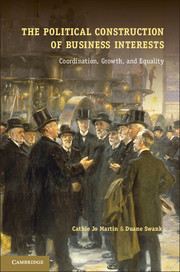Book contents
- Frontmatter
- Contents
- Figures
- Tables
- Acknowledgments
- Introduction
- 1 Collective Political Engagement and the Welfare State
- 2 The Political Origins of Coordinated Capitalism
- 3 Party Conflict and the Origins of Danish Labor Market Coordination
- 4 British Experiments in National Employers’ Organization
- 5 Sectional Parties and Divided Business in the United States
- 6 The Origins of Sector Coordination in Germany
- 7 Twenty-First Century Breakdown? Challenges to Coordination in the Postindustrial Age
- 8 Institutional Sources of Employers’ Preferences for Social Policy
- 9 Employers, Coordination, and Active Labor Market Policy in Postindustrial Denmark
- 10 Employers and Active Labor Market Policy in Postindustrial Britain
- 11 The Failure of Coordination and the Rise of Dualism in Germany
- 12 The Political Foundations of Redistribution and Equality
- Conclusion Social Solidarity after the Crisis of Finance Capitalism
- Bibliography
- Index
1 - Collective Political Engagement and the Welfare State
Published online by Cambridge University Press: 05 June 2012
- Frontmatter
- Contents
- Figures
- Tables
- Acknowledgments
- Introduction
- 1 Collective Political Engagement and the Welfare State
- 2 The Political Origins of Coordinated Capitalism
- 3 Party Conflict and the Origins of Danish Labor Market Coordination
- 4 British Experiments in National Employers’ Organization
- 5 Sectional Parties and Divided Business in the United States
- 6 The Origins of Sector Coordination in Germany
- 7 Twenty-First Century Breakdown? Challenges to Coordination in the Postindustrial Age
- 8 Institutional Sources of Employers’ Preferences for Social Policy
- 9 Employers, Coordination, and Active Labor Market Policy in Postindustrial Denmark
- 10 Employers and Active Labor Market Policy in Postindustrial Britain
- 11 The Failure of Coordination and the Rise of Dualism in Germany
- 12 The Political Foundations of Redistribution and Equality
- Conclusion Social Solidarity after the Crisis of Finance Capitalism
- Bibliography
- Index
Summary
What counts in making a happy marriage is not so much how compatible you are, but how you deal with incompatibility.
Leo TolstoyIntroduction
What magical ingredients create societies that seem to have it all, in achieving their policy goals with a balance of efficiency and equality, economic growth, and social security? Is there something in the bubbling brew of civic engagement that permits some countries to obtain collective goals with benefits for a broad cross section of society? Why are some nations better able than others to reinvent their institutional commitments to growth and equality at points of major economic transformation? Can business managers be persuaded to develop strategic preferences for public policies and to sign onto the social deals that seek to balance economic growth and social protections? If so, what factors bring employers to cooperate with workers and other social groups, rather than to view the world as a stage for pitched economic strife?
Tolstoy’s quote about happy marriages at the beginning of this chapter captures a central theme of this book: Processes of collective engagement matter. The signature way that people come together to solve problems has enormous impact on whether they make it through the trials and tribulations of marital life. In like manner, nations evolve characteristic processes of collective political engagement among citizens and groups; and while these processes are themselves a work in progress, a characteristic manner of problem solving seems to endure, even as it evolves, across epochs.
- Type
- Chapter
- Information
- The Political Construction of Business InterestsCoordination, Growth, and Equality, pp. 6 - 27Publisher: Cambridge University PressPrint publication year: 2012



